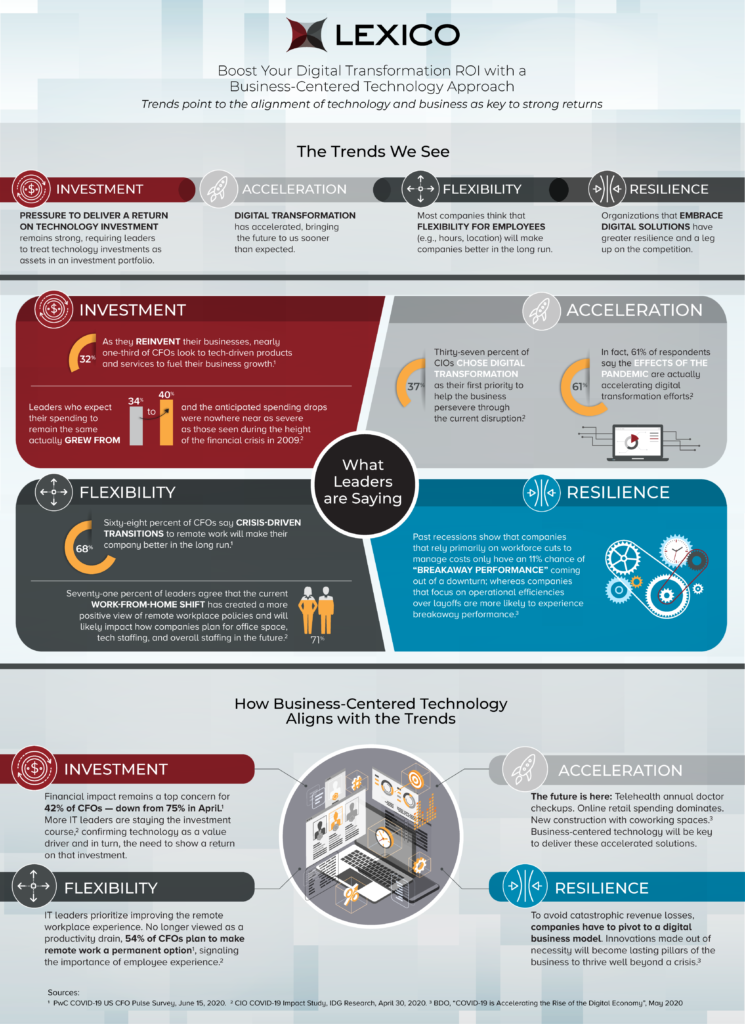In a new content series, Lexico looks at the trends pointing to the alignment of technology and business as being key to strong returns.
If you want to see a game-changing return on your digital transformation work, asking the right questions and taking a business-centered approach is critical. This means making any technology investments associated with digital transformation based on the needs and objectives of your business. These decisions inform your greater digital transformation strategy, and not only can improve digital transformation cost savings and efficiency, but also can boost growth and innovation, delivering an even stronger and more meaningful return.
A business-centered technology approach may represent a significant shift for your company, but it is one well-worth making, as pressure to deliver value from digital transformation efforts is at an all-time high.
Why It’s Important to Track Digital Transformation Metrics
Across industries, companies will spend 2-5% of revenue on technology and need to demonstrate the value of that investment. This is an indicator that technology is even more integral to business success, proving that IT and Business Partners need to take a business-centered technology approach to their strategy, priorities, governance, and operations.
A Business-Centered Technology Approach is Key for Successful Digital Transformation ROI
While the trends have shifted, a business-centered technology approach has solidly remained – and is proving to be the way forward.
Based on insights from business and technology leaders, we’ve created a new series on boosting digital transformation ROI through a business-centered technology approach. The image below is an overview of the four trends we’ve identified and are tracking, and we will be taking a deeper dive into each one, so you have a pulse on the ever-changing nature of digital transformation.
4 Trends For Strong Return on Technology Investment
KPI Trends We See for Digital Transformation
Return on Technology Investment
The pressure to deliver a return on technology investments remains strong, regarding leaders to treat technology investments as assets in an investment portfolio. As they reinvent their business, nearly one-third of CFO’s look to tech driven products and services to fuel their business growth. Leaders who expect their spending to remain the same actually grew from 34% to 40% and the anticipated spending drops are nowhere near as severe as those seen during the height of their financial crises in 2009.
Acceleration of Digital Transformation
Digital transformation has accelerated, bringing us sooner than expected. 37% of CIO’s chose digital transformation as their first priority to help the business persevere through the current disruption. In fact, 61% of respondents say that effects of the pandemic are actually accelerating digital transformation efforts
Flexibility for Employees
Most companies think that flexibility for employees (e.g., hours, location) will make companies batter in the long run. 68% of CFO’s say crisis-driven transitions to remote work will make the company better in the long run. 71% of leaders agree that the current work from home shift has created a more positive view of remote workplace policies and will likely impact how companies plan for office space, tech staffing, and overall staffing in the future
Resilience of Digital Solutions
Organizations that embrace digital solutions have greater resilience and a leg up on the competition. Post recessions show that companies that rely primarily on workplace cuts to manage costs only have an 11% chance of “breakaway performance” coming out of a downturn; whereas companies that focus on operational efficiencies over layoffs are more likely to experience breakaway performance.
How Business-Centered Technology Aligns with these Trends
Investment:
- Financial impact remains a top concern for 42% of CFO’s – down to 75% in April. More IT leaders are taking the investment course. Confirming technology as a value driver and in turn, the need to show a digital transformation ROI.
Acceleration:
- The future is here: Telehealth annual doctor checkups. Online retail spending dominates. New construction with coworking spaces. Business-centered technology will be key to deliver these accelerated solutions.
Flexibility:
- IT leaders prioritize improving the remorse workplace experience. No longer viewed as a productivity drain, 54% of CFO’s plan to make remote work a permanent option, signaling the importance of employee experience.
Resilience:
- To avoid catastrophic revenue losses, companies have to pivot to a digital business model. Innovations made out of necessity will become lasting pillars of the business to thrive well beyond a crisis.

